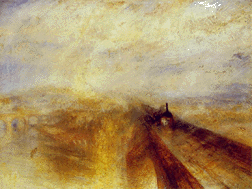University
of Wisconsin Oshkosh,
Department
of English
|

|
English 38-212,
English Literature II:
1800 to the present
Fall 1996
Section 1, Tuesdays and
Thursdays 1:20-2:50, Swart 240
Section 2, Mondays and
Wednesdays 3-4:30, Clow 245
Prof
Julie Shaffer
|
|
Turner's Rain, Steam and
Speed, London
|
|
|
Office: Radford
204
Phone: 424-0914
|
Office Hours: M
1-3
T, Th noon - 1
|
Course Description; Texts;
Course Requirements; Attendance
and Late Paper Policies; Schedule
As this
literature class is meant to be a survey of British literature
produced during the entirety of two centuries, including the Romantic
period, the Victorian period, the modern period (1885-1945), and the
post-modern or contemporary period, we cannot hope to be exhaustive
or even fair to any one period. We will do our best, however, reading
seminal works that convey important elements of each period and its
interests. We will thereby get some idea of the shifts in interests
and approaches to topics as each period addressed them in its
literature.
return
to top of syllabus
Required
Texts:
|
|
Romanticism
packet
Mary Shelley,
Frankenstein, 1818 version!
Charlotte Bronte, Jane
Eyre
Jean Rhys, Wide Sargasso
Sea
Early 20th-century poetry
packet
James Joyce,
Dubliners
Virginia Woolf, To The
Lighthouse
Caryl Churchill, Cloud
Nine
|
return to top of
syllabus
Course
Requirements: Attendance and active participation are vital to
making this course work for you and your classmates and are required.
This class will proceed by active class participation, and
participating orally will comprise no small part of your grade: it
can change your grade earned by written work in this class. Any of
you who are shy need to get over fears of speaking in front of your
peers!
Other oral requirements: Group
informal presentation to the class based on outside reading you do
about the literary figures, genres, related literature, or topics we
will be covering. Because we cannot each do outside research into
everything and everybody we'll be discussing in class, your doing
work on one topic and presenting it to the class in small groups is
one way to join efforts to work cooperatively, enabling us all to
learn more than each of us could on our own. Your presentations will
also help guide discussion on each of the texts we read. Please speak
to me beforehand about what you plan to do; I will be ready with
suggestions.
Written work: Two exams (short
answer and short essay) and two short papers (4-6 double spaced typed
pages on non-erasable paper). Each will be worth 20% of your grade.
Presentations and participation in discussion will make up the other
20% of your grade.
go to top of
syllabus
Attendance and
Late Paper Policies: If you miss more than three classes, your
grade will start to drop. If you miss more than three weeks, you may
fail. Save absences, therefore, for when you really need them. Very
late arrivals or very early departures will count as absences, as
will your coming to class unable to add to discussion from utter
unpreparedness - from not having read the text or performed written
work leading into discussion, for instance. If you are absent on days
on which we do group work, in addition to being marked absent, you
will receive a fail on that work. Assignments handed in late will
also adversely affect your grade, unless you have discussed your
need to hand a paper in late beforehand with me. Generally,
papers handed in late will drop one half letter grade for each day
they're late, and after one week, they will not be accepted.
Plagiarism, which I invariably catch, will result in a fail on the
paper, a fail in the course, and action taken against you through the
appropriate university channels. Newspaper reading, sleeping, private
conversation in class, along with any other rudenesses, will not be
tolerated.
go to top of
syllabus
Hypothetical
Class Schedule
subject to revision
Only the first day of each week is given
|
|
Week 1: Sept
4
Introduction
Week 2: Sept.
9
William
Wordsworth
|
|
Selections from the
1804 Preface to Lyrical Ballads
Selections from the
1850 version of The Prelude
"Intimations of
Immortality"
|
Week 3: Sept.
11
Samuel Taylor
Coleridge
|
|
"The Eolian
Harp"
"Frost at
Midnight"
"Fears in
Solitude"
|
Week 4: Sept.
16
Percy Bysshe
Shelley
|
|
Selections from "A
Defense of Poetry"
"Hymn to Intellectual
Beauty"
|
John
Keats
|
|
"Ode to a
Nightingale"
"Ode on a Grecian
Urn"
|
Lord
Byron
Week 5: Sept.
23
Mary Shelley,
Frankenstein (1818 version!)
Week 6: Sept.
30
Frankenstein,
continued
Exam
Week 7: Oct.
7
Charlotte Bronte, Jane
Eyre (1847)
Week 8: Oct.
14
Jane Eyre,
continued
Week 9: Oct.
21
Jean Rhys, Wide Sargasso
Sea
Week 10: Oct. 28
T. S.
Eliot
|
|
"The
Wasteland"
"The Love Song of J.
Alfred Prufrock"
|
Week 11: Nov.
4
William Butler
Yeats
|
|
"Adam's
Curse"
"The Folly of Being
Comforted"
"The Second
Coming"
|
Week 12: Nov.
11
James Joyce,
Dubliners
Week 13: Nov.
18
Virginia Woolf, To The
Lighthouse
Week 14: Nov.
25
To The Lighthouse,
continued
Thanksgiving
Week 15: Dec. 2
Caryl Churchill, Cloud
Nine
Week 16: Dec. 9
Catch up, wrap up
Final Exam (NOT
cumulative!)
|
return
to top of syllabus
go
to Julie Shaffer's list of courses taught
go
to Julie Shaffer's home page
go
to the University of Wisconsin English Department home
page
this site maintained
by Julie Shaffer, e-mail: shaffer@uwosh.edu
last updated 20 January,
1999
